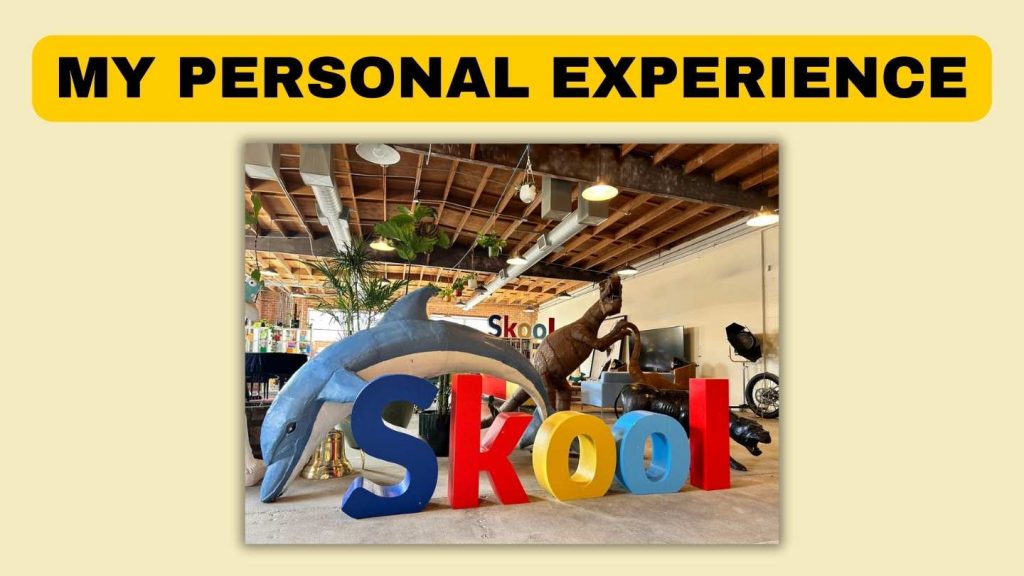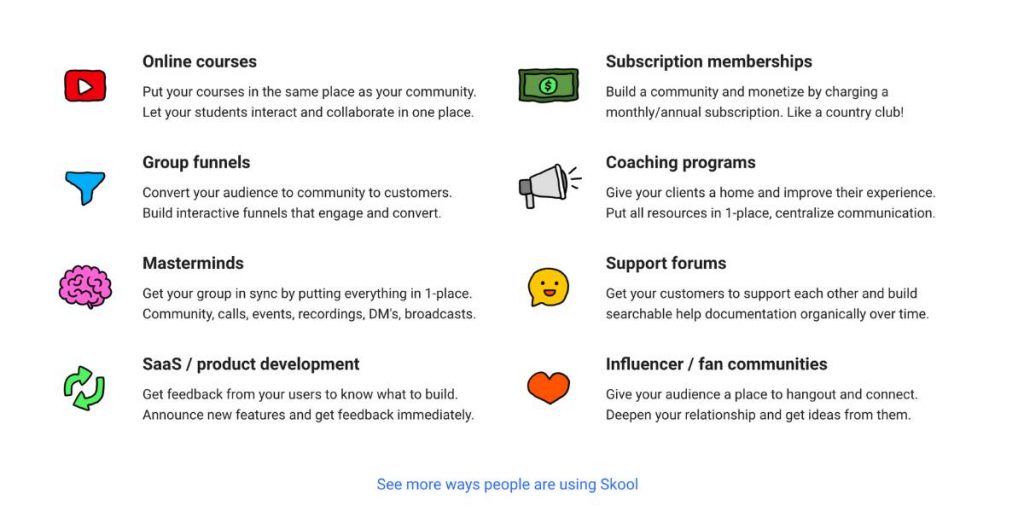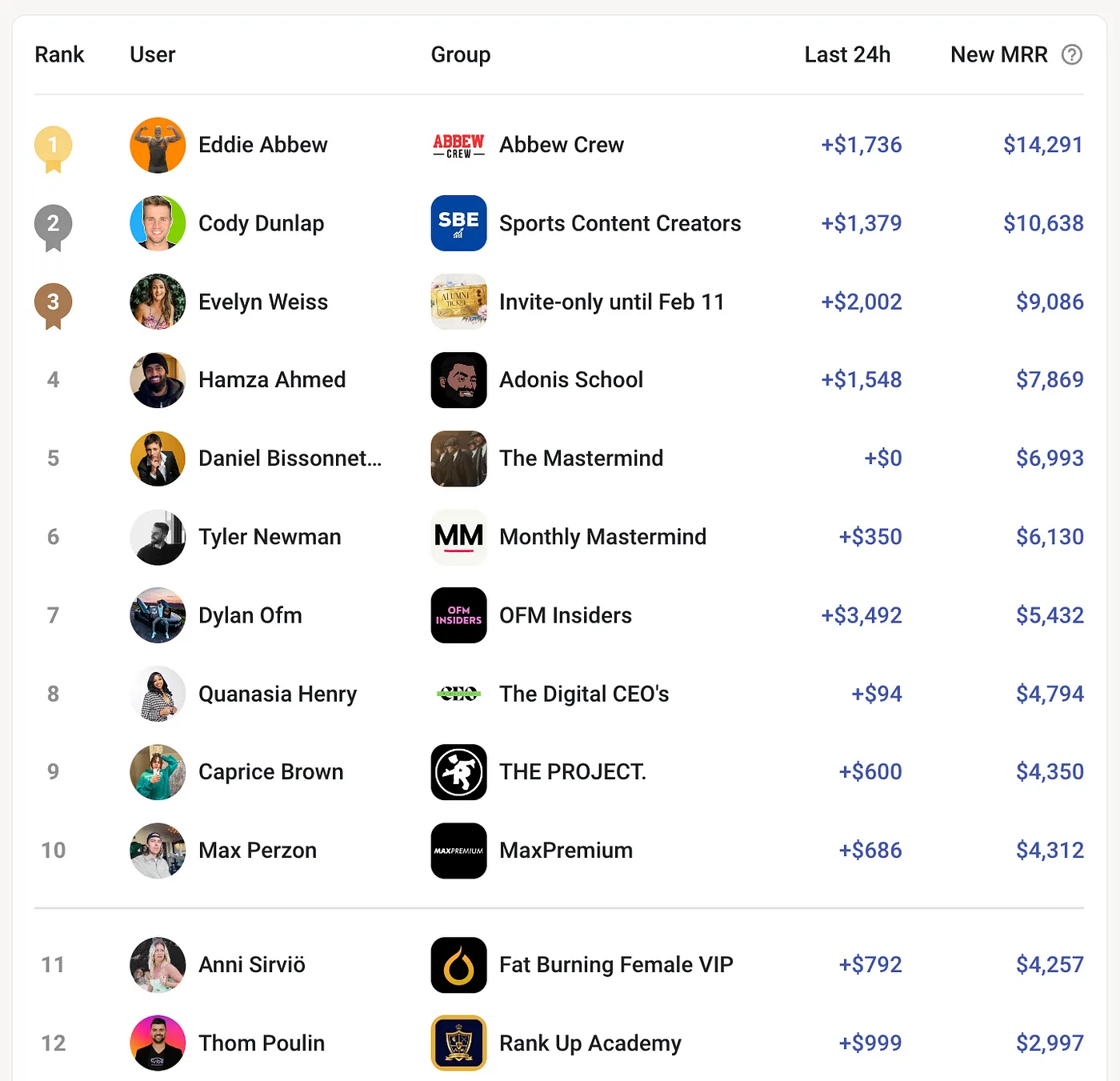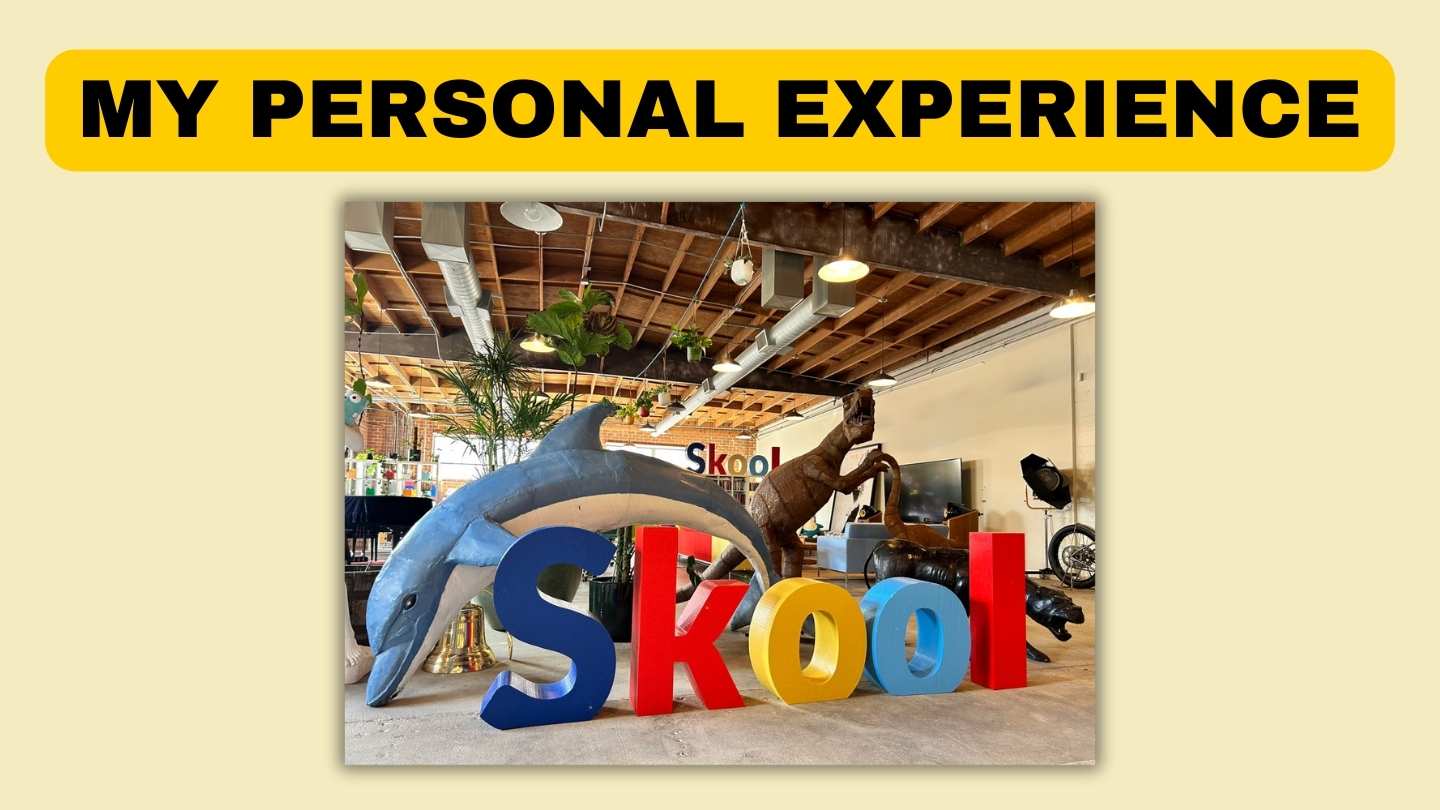
Are you a content creator or business owner looking to build a thriving online community?
If so, you’re in the right place!
you won’t need to build a website, a stripe account, or buy any other resources !!
just you and your audience
In this comprehensive Skool community ultimate guide ,
We’ll explore everything you need to know about Skool.com to help you make an informed decision in 2024.
We’ll dive deep into Skool’s features, pricing, pros and cons, and how it compares to other platforms like Kajabi, Facebook Groups, and Circle.
By the end of this guide, you’ll have all the information you need to decide if Skool is the perfect fit for your community-building needs.
Alex Hormozi bought a majority stake in Skool , and it has been growing ever since ,
Because users can discover your content from inside thier Skool application ,|
the potential for growth is insane !!
Did you know that out of every 2 people that start a skool community make money .
Yeah , 54.1 percent .
crazy statistics right ?
What’s inside?
- What is Skool?
- Who is Skool For?
- Why Skool is a game changer for content creators
- Key Features of Skool
- Pros and Cons of Skool
- Skool Pricing
- Skool vs. Competitors
- Additional Tools to Enhance Your Skool Experience
- Getting Started with Skool
- Conclusion
- FAQs
What is Skool?
Skool.com is an innovative online community platform designed to help creators, coaches, and entrepreneurs build and manage communities and courses in a distraction-free environment. Founded by Sam Ovens, Skool aims to simplify community building by providing an all-in-one solution that combines the best features of social media groups and course platforms without clutter and distractions.
With Skool, you can create a space where your members can interact, learn, and grow together, all while you have full control over the content and engagement.

Who is Skool community For?
Skool is ideal for:
- Content Creators: Bloggers, YouTubers, podcasters, and influencers who want to build a community around their content.
- Coaches and Consultants: Professionals offering coaching services who need a platform to host courses and interact with clients.
- Educators and Course Creators: Teachers and experts who want to offer online courses in a community setting.
- Entrepreneurs and Business Owners: Those looking to create a loyal customer base and foster engagement around their products or services.
Note: While Skool is excellent for digital products and services, it may not be the best fit for businesses focusing solely on physical products.
You can get Started Now with a FREE trial for 14 Days

Why Skool is a Game-changer for content creators
As a content creator, your goal is to connect with your audience, share valuable insights, and build a loyal following.
Traditional platforms like Facebook Groups often come with distractions, ads, and changing algorithms that can hinder your engagement efforts.
Skool offers a solution by providing:
Monetization Opportunities: Easily offer paid memberships or courses to generate revenue.
A Distraction-Free Environment: No ads, no unrelated content—just you and your community.
Full Ownership and Control: You set the rules, and you own your content and member data.
Enhanced Engagement: Features like gamification encourage participation and make your community more lively.
Skool.com Success Stories
How much can you make from skool ?
Skool.com has been instrumental in the success of many instructors, enabling them to turn their knowledge and skills into a profitable venture. Here are a few inspiring success stories from Skool.com instructors:
- Kenneth Smith, $11,000 MONTHLY RR in 3 Weeks (342 Members).
- Andrew Kirby, 11 people added $4,000+/month in 4 days!
- Ted Carr, $108,000 in 1 month with Skool

make sure you have something you can offer , could be anything people will pay for .
dont just create a community because others are doing it .
You can take use this FREE Skool launch checklist .
so you can get first 100 members without selling your soul.
Key Features of Skool
User-Friendly Interface
Skool boasts a clean and intuitive interface that makes it easy for both you and your members to navigate. The platform is designed to reduce clutter, ensuring that users can focus on engaging with content and each other.
- Simple Navigation: Easy access to different sections like community forums, courses, and member profiles.
- Unified Login: Members can access all their groups with a single login, simplifying the user experience.
Community Engagement Tools
Building an active community is effortless with Skool’s engagement tools:
- Discussion Boards: Create forums where members can start discussions, ask questions, and share insights.
- Private Messaging: Members can connect with each other privately to build relationships.
- Notifications: Keep your community informed about new posts, events, or course updates.
Course Hosting and Management
Skool allows you to host your courses directly on the platform:
- Rich Media Support: Upload videos, images, and text to create engaging lessons.
- Organized Curriculum: Structure your courses with modules and lessons for easy navigation.
- Progress Tracking: Members can track their progress through courses.
Note: Currently, Skool requires you to host videos on platforms like YouTube, Vimeo, or Wistia and embed them into your courses.
Do you know that the Average paid community on skool makes 1,360 usd per month
Gamification and Leveling Up
Increase engagement with Skool’s gamification features:
- Leveling System: Members earn experience points (XP) for participating in the community, which helps them level up.
- Leaderboards: Encourage friendly competition by showcasing top contributors.
- Unlockable Content: Set up content or courses that unlock as members reach certain levels.
Subscription and Monetization Options
Monetize your community with Skool’s flexible payment options:

- Paid Memberships: Charge monthly or annual subscription fees for access to your community or premium content.
- One-Time Purchases: Offer courses or products for a one-time fee.
- Integrated Payments: Seamless checkout experience increases conversion rates.
Pros and Cons of Skool
Pros
- Simplicity: Easy to set up and manage, allowing you to focus on content and engagement.
- Clean Interface: Distraction-free environment enhances user experience.
- Unlimited Members: No additional costs as your community grows.
- Gamification: Engaging features encourage active participation.
- Affordable: Competitive pricing compared to other platforms.
- Mobile App: Stay connected with your community on the go.
Cons
- No Native Video Hosting: Requires external platforms for video content.
- Limited Customization: Fewer options for branding and design compared to some competitors.
- No Built-in Sales Funnels: You’ll need external tools for advanced marketing needs.
- Limited File Hosting: Cannot upload PDFs or other files directly; must use external links.
Skool Pricing
Skool offers a straightforward pricing model:
- 14-Day Free Trial: Test out the platform with no obligations.
Start your free Trial Now - Monthly Subscription: $99 per month per community.
- Includes unlimited members and courses.
- Access to all features and future updates.
- Dedicated customer support.
Note: Skool does not currently offer a lifetime deal or tiered pricing based on features.
Skool vs. Competitors
Skool vs. Kajabi
Kajabi is an all-in-one platform offering course creation, email marketing, and website building. While it provides more features, it can be overwhelming and expensive.
- Pricing:
- Kajabi starts at $149 per month.
- Skool is $99 per month.
- Features:
- Kajabi offers more tools but can be complex.
- Skool focuses on community and course hosting with simplicity.
- Ideal For:
- Kajabi suits businesses needing a complete marketing suite.
- Skool is perfect for those wanting a straightforward community and course platform.
Conclusion: If you prefer simplicity and a focus on community engagement, Skool is the better choice.
Skool vs. Facebook Groups
Facebook Groups are free and familiar but come with distractions and algorithm changes that can impact your community.
- Distractions: Ads and unrelated content can pull members away.
- Limited Control: Facebook owns the platform and can change rules anytime.
- Engagement Issues: Posts may not reach all members due to algorithms.
Skool Advantages:
- Distraction-Free: No ads or unrelated content.
- Full Ownership: You control your community’s rules and content.
- Better Engagement: Members receive notifications for all posts.
Conclusion: For a focused and controlled community experience, Skool outperforms Facebook Groups.
Skool vs. Circle
Circle is another community platform offering more customization but at a variable cost.
- Pricing:
- Circle starts at $39 per month but charges more as your community grows.
- Skool offers unlimited members for $99 per month.
- Features:
- Circle provides more design flexibility.
- Skool offers gamification and leveling features.
- Ideal For:
- Circle suits those needing advanced customization.
- Skool is ideal for those who prefer simplicity and engagement features.
Conclusion: If unlimited members and gamification are important, Skool is the better option.
Additional Tools to Enhance Your Skool Experience
While Skool covers community and course hosting, you may need additional tools for a complete setup:
Sales Funnel Builder
To create sales pages and capture leads, consider:
- ClickFunnels: User-friendly tool for building sales funnels.
- Thrive Themes: WordPress-based solution for creating conversion-focused websites.
Email Marketing System
Stay connected with your audience using:
- ConvertKit: Easy-to-use platform for email marketing and automation.
- Mailchimp: Popular choice for managing email campaigns.
Video Hosting Platforms
Since Skool doesn’t host videos natively, use:
- YouTube: Free but may include ads.
- Vimeo: Paid plans offer ad-free hosting.
- Wistia: Professional video hosting with advanced features.
Getting Started with Skool
Ready to build your Skool online community? Here’s how to get started:
- Sign Up for the Free Trial: Visit Skool.com and sign up for the 14-day free trial.
- Set Up Your Community:
- Customize your community name and description.
- Set up your group rules and guidelines.
- Create Your Courses:
- Organize your content into modules and lessons.
- Embed your videos and add supporting materials.
- Invite Members:
- Share your community link with your audience.
- Promote your community on social media and email lists.
- Engage and Grow:
- Encourage discussions and participation.
- Use gamification features to boost engagement.
Conclusion
Skool offers a powerful yet simple solution for content creators and business owners looking to build and monetize an online community. With its user-friendly interface, engagement tools, and course hosting capabilities, it’s an excellent choice for those wanting to focus on community building without the distractions of more complex platforms.
While it has some limitations, such as the need for external video hosting and lack of advanced customization, the benefits of a distraction-free, engaging environment make Skool a compelling option in 2024.
FAQs
1. Can I try Skool before paying?
Yes! Skool offers a 14-day free trial so you can explore the platform before committing.
2. Does Skool support multiple communities under one account?
Each community requires its own subscription at $99 per month. However, you can access all your communities with a single login.
3. Can I customize the look and feel of my Skool community?
Skool offers basic customization options like adding a logo and changing colors, but it doesn’t provide extensive design customization.
4. Is there a mobile app for Skool?
Yes, Skool has a mobile app available for both iOS and Android, allowing members to stay connected on the go.
5. How does Skool handle payments for paid memberships?
Skool integrates with payment processors to handle subscriptions and one-time payments, providing a seamless checkout experience for your members.

Ready to build your thriving online community?
Visit Skool.com and start your journey today!
I’ll love to hear about your experiences with Skool or any questions you might have. Please share your thoughts in the comments below.


